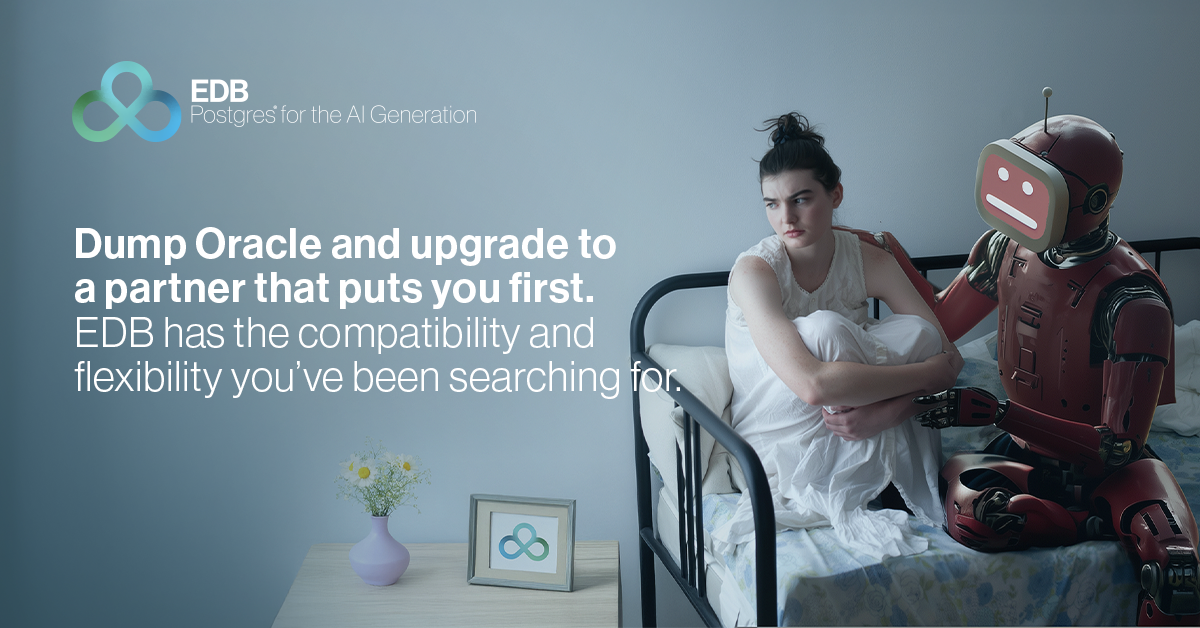The fastest on-ramp to database migration and legacy application modernization begins with EDB Postgres® AI
The financial factors driving organizational Oracle to Postgres migrations are well-publicized and no longer represent breaking news. At a time when open source Postgres adoption grows year over year, Oracle's price point remains at a premium, and the need for specialized personnel continues to inflate budgets.
But, we acknowledge financially moving on from Oracle may actually represent the easiest consideration for an organization looking to close the deal in their overdue breakup with legacy database solutions. Today’s buzz instead focuses on how enterprises can remove obstacles to innovation and modernize their legacy apps by deploying open source Postgres solutions that can address new AI and analytical workloads, as well as enterprise-grade transactional database demands.1
Examining the heart of legacy application modernization struggles
Migrating legacy applications can be a heavy lift. From outdated systems and complex databases to the challenge of ensuring minimal disruption during the transition, it’s no surprise that legacy migrations often end up being delayed, over-budget, and painful.
Faltering legacy system modernization projects strain organizations across multiple competitive and operational fronts, including:
- Stalling product innovation: Enterprises experience an inability to deliver product / feature innovation, due to data infrastructure challenges, including legacy tech, data silos, and management complexity. The fallout here involves product launch slips, low business agility, and missed revenue opportunities.
- Disrupting developer productivity: Developer capabilities are hindered by legacy technology, challenges with adopting open source software, security and compliance blockers, and high administrative burden. The adverse end results include low developer productivity, high TCO, software vulnerabilities, and associated security and compliance issues.
- Perpetuating developer churn: With the latest StackOverflow results showing PostgreSQL outranking Oracle at a ratio of 48.7% to 10.1%, it’s clear the best engineering talent wants to use open source, especially cloud-native tech that integrates well with modern data and AI ecosystems. Without enterprise open source, developer retention and performance issues can ensue, resulting in potentially inferior product releases.
Modern applications require diverse data models and the accessibility, interoperability, and cost benefits delivered by open source Postgres—not legacy Oracle database infrastructures.
Accelerating your Oracle migration and legacy application modernization success with EDB Postgres AI
For decades, EnterpriseDB has helped customers complete successful Oracle to Postgres database migrations and reduce TCO up to 80% in the process. With the recent enhancements provided in our EDB Postgres AI platform, we’re extending our Oracle migration and modernization solution to assure legacy application modernization success for today’s global enterprises and government agencies.

With built-in Oracle compatibility delivered by EDB Postgres Advanced Server, EDB customers can reduce application rewrites up to 95% and eliminate disruptions when migrating from Oracle to EDB Postgres AI. EDB Postgres AI migration tools — including the Migration Portal, Migration Toolkit, and Replication Server — simplify the process, ensuring that the database portion of migration projects can be completed in less than 20 days. The AI-powered EDB Migration Portal helps reduce risks by guiding teams through potential challenges and resolving compatibility issues.
Whether deploying on-premise, in hybrid environments, or across major public clouds (AWS, Google Cloud, Microsoft Azure), organizations can enjoy the full benefits of EDB Postgres AI without compromising on performance or scalability.
Streamlining legacy application migrations: speed, flexibility, and security
Once you’ve successfully migrated your Oracle environment, EDB Postgres AI lets enterprises modernize their infrastructure without slowing down operations.
Beyond migration, running EDB Postgres Distributed (PGD) on EDB Postgres AI provides a robust alternative to Oracle Real Application Clusters (RAC) for high availability. PGD delivers up to 99.999% uptime, ensuring global applications remain functional with zero downtime, including self-managed EDB Postgres AI cloud infrastructures running on Amazon Web Services, Google Cloud, and Microsoft Azure. As organizations transition legacy applications to modern Postgres infrastructure, this feature minimizes Tier 1 Application impacts.
With the Oracle Estate Migration Assessment feature in EDB Postgres AI Software Deployment’s Hybrid Control Plane (HCP), architects get a complete picture of their Oracle environment before making the switch. This allows you to visualize the migration effort, understand potential issues, and make informed decisions on which databases to prioritize for migration.
In addition, the HCP provides the ability to synchronize data from Oracle to Postgres databases, giving enterprises a unified view of data across legacy and modern estates, helping teams reduce the manual overhead of ETL processes, and enabling holistic insights into business performance.
The popular EDB Migration Portal with AI Copilot is now available as part of the HCP, which means that customers can now use it in their on-premises environments when they deploy the HCP onsite. As a result, customers can benefit by maintaining full sovereignty over their database schema and data.
Learn more at our webinar
In our Love at First Query: Moving on from Oracle to EDB webinar, we are focusing on how the unified EDB Postgres AI sovereign data platform paves the way to modernize legacy applications that support transactional, analytical, and AI workloads.
If your organization is considering Oracle modernization or legacy application migrations, this webinar will provide key insights about EDB Postgres AI:
- Accelerates time to market for new applications
- Enables application development teams to move faster, while ensuring enterprise-grade security, reliability, and scalability
- Promotes open standards convergence (e.g., Postgres, Kubernetes, etc.) and a modern cloud-native stack that can help attract and retain top-tier engineering talent
- Provides a single solution to unify transactional, analytics, and AI workloads in Postgres
- Delivers deployment flexibility that brings cloud agility to the environment of your choice, without being locked into a specific infrastructure vendor
Don’t miss the chance to learn how EDB Postgres AI can help you streamline your transition to a modern, cloud-native architecture. Matthew Lewandowski, EDB Senior Product Manager of Migration Technologies, will guide you through the entire process and answer your questions on how to best modernize your legacy systems efficiently and confidently.
- https://www.gartner.com/doc/reprints?id=1-2ES92EBS&ct=230823&st=sb
